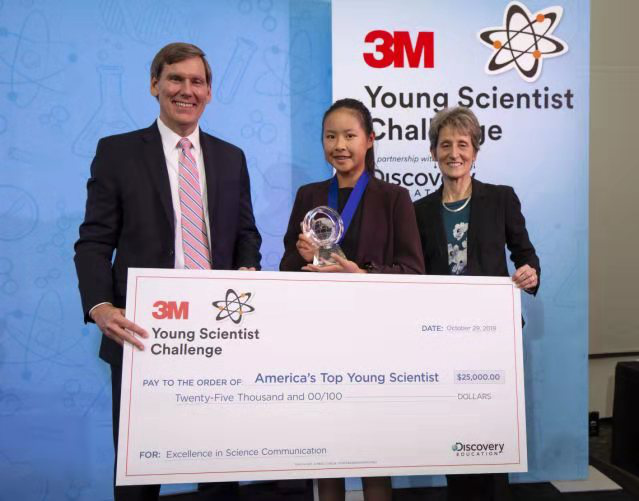
“The moment before they called my name, I was really nervous because the other finalists’ presentations are really good and I thought they would win,” Kara Fan, 14, who has won America’s Top Young Scientist, told Yahoo Finance. “When they announced my name, I was really surprised actually.”
To win that claim, Fan’s nano-particle liquid bandage had to surpass the experiments of hundreds of fifth to eighth graders as well as nine other finalists. Fan started developing her liquid bandage in April 2019 to fight the overuse of antibiotics.
According to the CDC, roughly 2 million people every year suffer a bacterial infection in the U.S. and about 23,000 passed away as a result. If left alone, a UN study reported, drug-resistant diseases or the “superbug” could lead to 10 million deaths across the globe by 2050. When Fan’s sprayable bandage dries on a person’s skin, it creates a thin layer that protects the wounded area while breaking the cell wall and killing the bacteria on the skin. After experimenting with copper nitrate to fight bacteria, switching to the silver nitrate ended up being the major catalyst(催化剂) to seeing results for her award-winning project.
“Thousands of years ago, ancient people would use copper and silver to eat with and they would drink water from like copper bowls to kill bacteria,” Fan explained. “I found out that it didn't work. So I used nano silver.” Sir Alexander Fleming’s discovery of penicillin—a type of antibiotic—is Fan’s favorite scientific discovery. That said, she doesn’t think humans should rely too heavily on penicillin.
Following her years at Westview High School, Fan hopes to continue her biology track at Stanford University. Along with the $25,000 cash prize she won on October 29, becoming America’s Top Young Scientist may help get the private university’s attention.
本时文内容由奇速英语国际教育研究院原创编写,未经书面授权,禁止复制和任何商业用途,版权所有,侵权必究!(作者投稿及时文阅读定制请联系微信:18980471698)
1.The contestants did NOT include students from ______.
A the fifth grade
B the sixth grade
C the eighth grade
D the ninth grade
解析:选D。细节理解题。根据第二段To win that claim, Fan’s nano-particle liquid bandage had to surpass the experiments of hundreds of fifth to eighth graders as well as nine other finalists.可知,Fan的纳米颗粒液体绷带必须超越几百名五至八年级学生以及其他9名决赛选手的实验项目,参赛者不包括九年级学生,故选D。
2.What does the underlined word “superbug” refer to?
A A kind of flu.
B A terrible insect.
C Drug-resistant bacteria.
D A widespread disease.
解析:选C。词义猜测题。根据文章第三段内容提示美国每年约有200万人遭受细菌感染,大约23,000人因此去世。联合国的一项研究报告说,这是一种耐药性疾病,由此推断superbug意为“耐药细菌”,故选C。
3.What’s the main reason for Kara Fan to win the award?
A Composing the catalyst with silver nitrate.
B Finding a new method to fight against the superbug.
C Developing a drug which can easily kill the bacteria.
D Using silver nitrate instead of copper nitrate to fight bacteria.
解析:选D。细节理解题。根据第三段After experimenting with copper nitrate to fight bacteria, switching to the silver nitrate ended up being the major catalyst to seeing results for her award-winning project.可知,Fan因为用硝酸银代替硝酸铜来对抗细菌而获奖的,故选D。
4.What can we learn from the passage?
A Kara Fan showed great interest in biology in senior high school.
B Kara Fan thought humans should rely heavily on penicillin.
C Ancient people killed the bacteria by eating food with antibiotic.
D Stanford University offered the $25,000 scholarship to Kara Fan for further education.
解析:选A。推理判断题。根据最后一段Following her years at Westview High School, Fan hopes to continue her biology track at Stanford University.可知在韦斯特维尤高中就读多年之后,Fan希望在斯坦福大学继续她的生物课程,由此推测她在高中时就对生物学表现出极大的兴趣,故选A。